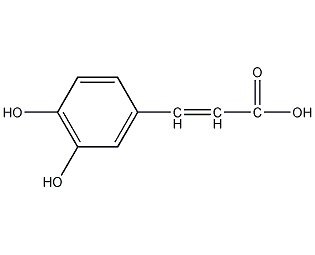
Structural formula
| Business number | 0494 |
|---|---|
| Molecular formula | C9H8O4 |
| Molecular weight | 180.16 |
| label |
3,4-dihydroxycinnamic acid, Hydrolyzed coffee tannic acid, 3,4-Dihydroxycinnamic acid (caffeic acid), 3,4-Dihydroxycinnamic acid, 3-(3,4-Dihydroxyphenyl)-2-propenoic acid, 3,4-Dihydroxybenzeneacrylic acid, Antibacterial agents, acidic solvent |
Numbering system
CAS number:331-39-5
MDL number:MFCD00004392
EINECS number:206-361-2
RTECS number:GD8950000
BRN number:2210883
PubChem number:24278290
Physical property data
1. Physical property data
1. Characteristics: yellow crystal (water), turns orange when exposed to alkali solution, and is irritating.
2. Density (g/mL, 25/4℃): 1.478
3. Relative vapor density (g /mL, air=1): Not available
4. Melting point (ºC): 194-198
5. Boiling point (ºC, Normal pressure): 223~225 (dec)
6. Boiling point (ºC, 5.2kPa): Not available
7. Refractive index : Not available
8. Flash point (ºC): 220
9. Specific rotation (º): Not available
10. Autoignition point or ignition temperature (ºC): Not available
11. Vapor pressure (kPa, 25ºC): Not available
12. Saturated vapor pressure (kPa, 60ºC): Not available
13. Heat of combustion (KJ/mol): Not available
14. Critical temperature (ºC): Not available
15. Critical pressure (KPa): Not available
16. Logarithmic value of oil-water (octanol/water) partition coefficient: Not available
17. Explosion upper limit (%, V/V): Not available
18. Lower explosion limit (%, V/V): Not available
19. Solubility: soluble in hot water, ethanol, slightly soluble in cold water
Toxicological data
2. Toxicological data:
Acute toxicity:
Main irritant effects:
On the skin: Irritating to the skin and mucous membranes.
On the eyes: Irritation effects.
Sensitization: No known sensitizing effects.
Ecological data
3. Ecological data:
1. Other harmful effects: This substance may be harmful to the environment, and special attention should be paid to water bodies.
Molecular structure data
1. Molar refractive index: 47.47
2. Molar volume (cm3/mol): 121.8
3. Isotonic specific volume (90.2K ): 362.0
4. Surface tension (dyne/cm): 77.8
p>
5. Polarizability (10-24cm3): 18.81
Compute chemical data
1. Reference value for hydrophobic parameter calculation (XlogP): None
2. Number of hydrogen bond donors: 3
3. Number of hydrogen bond acceptors: 4
4. Number of rotatable chemical bonds: 2
5. Number of tautomers: 16
6. Topological molecule polar surface area 77.8
7. Number of heavy atoms: 13
8. Surface charge: 0
9. Complexity: 212
10. Number of isotope atoms: 0
11. Determine the number of atomic stereocenters: 0
12. Uncertain number of atomic stereocenters: 0
13. Determine the number of chemical bond stereocenters: 1
14. Number of uncertain chemical bond stereocenters: 0
15. Number of covalent bond units: 1
Properties and stability
1. Stable properties under normal temperature and pressure.
2. Exist in tobacco leaves and smoke.
3. The alkaline solution changes from yellow to orange.
Storage method
None yet
Synthesis method
1. Extract rhizomes of Cimicifuga single panicle with methanol, and concentrate under reduced pressure to remove methanol. Dissolve the residue in hot water and filter out the insoluble matter while it is hot. After cooling, add benzene for extraction. The benzene solution is washed with 1% sodium bicarbonate aqueous solution, and the washing liquid is collected. Add dilute hydrochloric acid to acidify, use benzene to free the organic acid from it, and concentrate under reduced pressure to remove benzene. The residue is a caffeic acid-enriched product.
2. Tobacco: FC, 53, 54. Obtained from acid hydrolysis of chlorogenic acid.
Purpose
1. Intermediate of caffeic acid. Used in organic synthesis.
2.It can be used safely in cosmetics and has a wide range of antibacterial and antiviral activities. Can absorb ultraviolet rays. It is an additive that inhibits skin-type hair dyes at low concentrations and helps enhance the intensity of color.

 微信扫一扫打赏
微信扫一扫打赏

